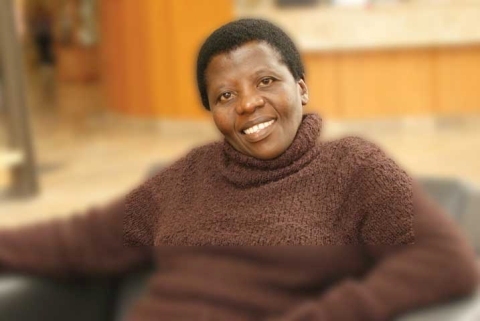Meet Daphne Mathebula

Daphne Mathebula lives in Johannesburg, South Africa, where she is the Africa regional coordinator for Sunday School and Discipleship Ministries International (SDMI) and Connecting a New Generation. Born in Ventersdorp, Free State, and raised in Soweto, Johannesburg, she was ordained in 1993. She and her husband, Caleb, have two adult children and one grandson.
What is your best childhood memory?
My father coming home from work and picking up each of us four children and throwing us in the air. Even the neighbor kids came over for their turn.
How has your background affected your worldview?
I've always had a different perspective on life. I was raised in an environment that strongly discriminated against my race and gender and made me feel like nothing. However, I praise God my parents thought differently.
At age 12 I came to a point where I decided, 'It doesn't matter what color I am, or what gender I am. I am a human being. I'm not going to live my life as though I don't exist.'
I thought, 'If you're going to live like this, you're never going to live.' That day changed my life.
My self-esteem was built from that point. And I decided to see people as human beings first. This worldview has not been without struggles.
How do you manage to keep up with responsibilities throughout a continent?
It's challenging but we try to communicate with the field strategy coordinators and encourage our people to share their updates in any way they can for the seven African fields. I travel around the continent, when invited, to give workshops on SDMI. We work as a team with the other entities.
What role does theology play in what you do?
I have to understand God and His ways of working as I try to understand His people. Part of my theological training involved psychology and sociology. For enduring results, I can't force my opinion but strive to influence others, even if only through prayer.
Also, part of my responsibility is to develop resources. I have to know what is theologically and biblically correct.
If you weren't in this career, what might you be doing?
I would probably be a nurse. (I trained as a nurse before my theological training.)
What's the best part of your assignment?
Meeting with people from around the region and hearing their stories. I like to travel to their areas to see God at work there.
Also, to see all of the different regional ministries working together towards making Christlike disciples. We're coming together, not as individuals, but as different parts of the body to accomplish one goal.
What are some of your favorite foods?
Traditional African food such as Pap, which is porridge made of ground mielie-meal (ground maize or other grain), and wild greens. We do flavorful things with various animal parts too'so delicious. We don't throw away anything, except for the non-chewable parts!
How do you cope when dealing with cross-cultural situations?
Before I go into a culture, I try to learn what would be offensive to them and also try to maintain my own identity. I work to accommodate the cultures.
Have you had mentors?
Yes, although they, and I, may not have been intentional about it. Now that we are emphasizing discipleship and the need for mentoring it makes it easier to recognize the individuals and the processes involved as it is happening.
If you could pick a dream destination, what would it be?
Senegal. Because I have friends there and whenever I go to the U.S., I go through Dakar, the capital, in my travels, but I never get off the plane. Some day, I want to get off the plane and walk on Senegali soil.
What would we be surprised to learn about you?
That I'm difficult to live with.
We don't believe that for a minute! What else might surprise us?
Well, I went ice skating indoors in Johannesburg in my late forties.
What's happening for you on the Africa Region?
One of the exciting things is that in the past, some of us used to think of the Sunday School class as being on Sunday morning. We still had women's and men's Bible studies, children's groups, and so on. It wasn't necessarily all connected to Sunday morning. People are beginning to see these groups as part of Sunday School and Discipleship Ministries.
People are excited about the Church of the Nazarene's mission statement to make Christlike disciples in the nations. All of the ministries that they have been doing are discipleship. It's reaffirming.
Favorite hobbies?
Reading. Singing.
Favorite music?
Choral and gospel music'music with a timeless message.
Favorite books?
Right now, I'm enjoying older books pertaining to various aspects of discipleship. I want to know the foundations of concepts I find in newer books.
Please note: All facts, figures, and titles were accurate to the best of our knowledge at the time of original publication but may have since changed.




